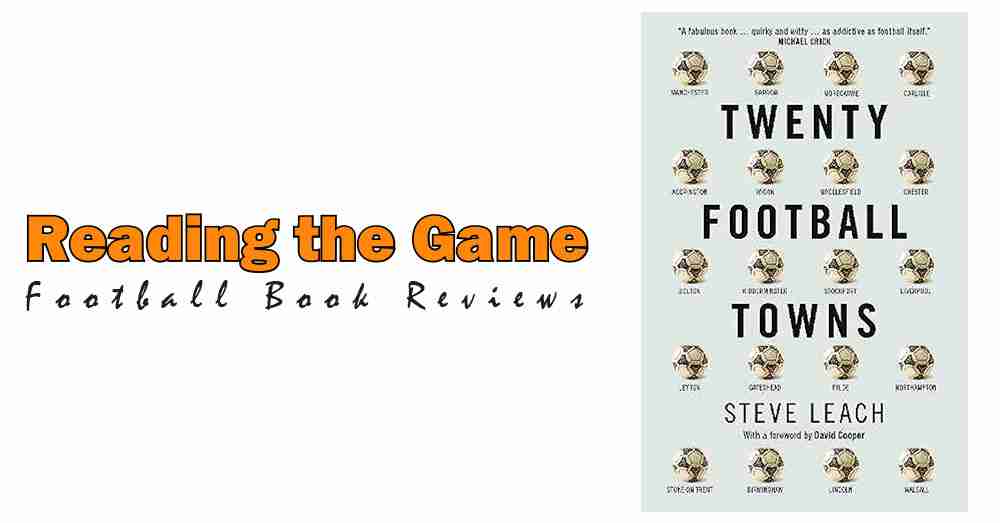After last week’s review of The Billionaires Club, I was in need of a change. Having read that, Wings of Change and Champagne Football in quick succession, I was getting a little jaded. All three books are excellent, but a little depressing for football romantics, or those who, like me, plug away in the lower levels, where every penny counts.
I didn’t want a book where money, political power or brand development were central themes; fortunately, I alighted on Twenty Football Towns by Steve Leach. Over 12 months, stretched across two seasons, the author visits 20 different places, watching matches in 18 of them. Each chapter starts with Leach setting out why the place in which he finds himself is personally meaningful before segueing into a light travelogue based around pre-match explorations. Then, we get a summary of the matchday experience, except in the chapters on Manchester and Liverpool, where the pre-pandemic Premier League experience is not sampled.
There are numerous reasons for Leach’s shunning of the top-flight teams in his hometown (Manchester) and former workplace (Liverpool). One is the author’s stated preference for football in the lower divisions, albeit not too low; none of the featured clubs plays below the regional levels of the National League. Leach acknowledges that his decision to reject the attractions of the club nearest his current home, Kendal Town, in favour of Morecambe, Carlisle United and Barrow might be unfair on the Mintcakes, but having made that choice, he does at least feature all three of his local ‘big’ clubs.
Leach’s semi-regular support of the Shrimps, Blues and Bluebirds hints at a certain promiscuity, in football terms which, to a degree, I share. His first footballing love was Manchester City, but an already strained relationship with the Citizens was ended by the club’s control by first Thaksin Shinawatra and then Abu Dhabi United, both of which are opposed by the author on principle. Having grown up in Stockport, Leach acknowledges having been a County supporter since 1957; the Hatters duly feature in this book, alongside clubs as diverse as Leyton Orient, Lincoln City and Gateshead, amongst others.
Twenty Football Towns is published by Saraband, whose website says they “publish authors with deep knowledge of the culture, local landscapes, wildlife, folk traditions and history in regions around the UK”. That should tell you something about this book and about the relationship that many fans, Steve Leach included, have with the game. As I’ve mentioned before, a lot of the time, the match is incidental to the experience. We get a real sense of that in Twenty Football Towns; Leach wanders through each town on his way to the match and, as he tells that tale, weaves his memories and experience into the text. It helps that our hero was at the Manchester gig when Bob Dylan went electric and was called a ‘Judas’, embraced fatherhood later in life and looks at each of the places he visits through a lens which, while not being rose-tinted, certainly lets in a lot of light. There’s a light, easy tone to the text coupled with a gentle wit, making this a genuine page-turner.
This book is as much a memoir as it is a trip through English football’s lower divisions and is all the better for it. It’s almost Fever Pitch for groundhoppers, although it doesn’t strictly follow the linear structure of Nick Hornby’s seminal work.
I was probably softened up by lots of tangential connections to the story Steve Leach told. Examples; the teenage me was once ushered into Leyton Orient’s offices by Barry Hearn, who helped sort out my Press Pass. The one occasion a non-League club I was involved in reached the First Round Proper of the FA Cup, we went to Lincoln City. Our family once had a holiday in a caravan park opposite Morecambe’s Globe Arena and my current home, Kirkby, gets a (disparaging) mention when the author quotes a Liverpool folk song. It turns out that the author was born in the same year as my late father, which perhaps helped me connect with him; I understood the pragmatic, glass half-full view of lower division football and the towns in which it is played that Leach took, because that kind of view was taken by Dad and so many of his contemporaries. The tendency to explore and relocate was another common trait, although Dad’s pursuit of opportunities took him to the South of England and to Germany, rather to the towns in which the author lived and worked. And while he might not have been at the Free Trade Hall, Dad was a Bob Dylan fan; something he has passed down to both me and my eldest child.
This is a book for match-goers and particularly match-goers who pootle around the lower tiers of professional football or who regularly watch non-League football. It’s a book for those who love small-town England, even if they’re not really football fans. Twenty Football Towns is a warm, well-written tale which will appeal to many. It’s a useful reminder that every town is unique, every club is different and that football is about so much more than money.
I reckon Dad would have liked it almost as much as I did.
At the end of these reviews, I make a point of linking to the Stanchion Books website when they carry the book and this week is no exception. It is also available direct from the publisher as well as from the usual suspects and well worth reading.
